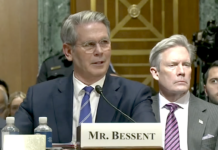
(GA Recorder) — A bipartisan group of former federal and state officials – including former Secretary of the Interior Bruce Babbitt, who helped block a strip-mining proposal near the Okefenokee Swamp decades ago – have come out in opposition to a plan to mine at the “doorstep” of the wildlife refuge.
The group took out a full-page ad in the Sunday edition of the Atlanta Journal-Constitution to prominently publish a letter condemning the proposed mining project. The Okefenokee Protection Alliance, which is a coalition of groups opposing the project, paid for the advertisement.
“There is a time and place for industry, but it’s not on the edge of the Okefenokee,” the ad reads. “The state should engage national and local leaders in a stakeholder effort and provide the direction and leadership to permanently end the threat of mining near the Okefenokee National Wildlife Refuge.
“If a wild and pristine Okefenokee is lost, future generations will not forgive us,” the ad continued.
The group pointed to the failed mining proposal from the 1990s, which chemical giant DuPont abandoned after Babbitt, who served under Democratic President Bill Clinton, Gov. Zell Miller, a conservative Democrat, and others slammed the company’s plan to strip mine along the eastern ridge bordering the largest U.S. wildlife refuge east of the Mississippi River.
Former Secretary of the Treasury, Henry Paulson Jr., who served under President George W. Bush, and directors of the U.S. Fish and Wildlife Service under Presidents Nixon, Ford and Carter also signed onto the letter.
Lonice Barrett, a former commissioner of the state Department of Natural Resources under Democratic governors Miller and Roy Barnes and Republican Gov. Sonny Perdue, and Noel Holcomb, who served as commissioner under Perdue, also backed the message.
Alabama-based Twin Pines Minerals plans to mine for titanium dioxide along the edge of the wildlife refuge, a proposal that has won over supporters with its promise of new jobs in a rural corner of the state.
Twin Pines has submitted applications for permits, and the state Environmental Protection Division, which is housed within the Department of Natural Resources, last week requested more information from Twin Pines.
The company wants to start out by conducting a 740-acre mining demonstration along Trail Ridge, which is a hydrological divide between the swamp and St. Marys River. But it has signaled it plans to grow its footprint, although the state has said expansion would require new permits.
Environmentalists and others have panned the proposal as a needless threat to a prized natural wonder that is home to more than 600 plant species as well as rare animals like indigo snakes, gopher tortoises and wood storks – features that have made the gator-filled area a tourist destination for wildlife lovers.
The group of former officials also raised concerns about the potential impact a mine could have on tourism should water levels drop as result of the mining, damaging the ecosystem.
“With as many as 700,000 annual visits, the refuge supports over 750 local jobs and generates $64 million for local communities per year. Risking the continued growth of Georgia’s recreational tourism economy to mine titanium dioxide—a product commonly used to whiten household paint—defies common sense,” they wrote in the ad.
A group of faith leaders, including dozens of Christian ministers, rabbis and imams, also recently sent a letter to Charlton County commissioners, the state’s U.S. senators and Gov. Brian Kemp urging them to reject the project. The letter refers to the Okefenokee Swamp as “a uniquely holy and sacred space.”







